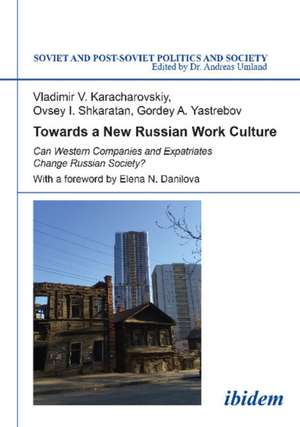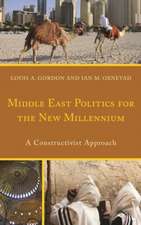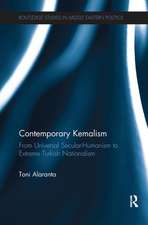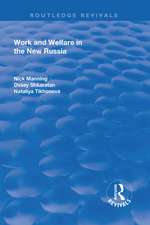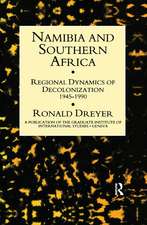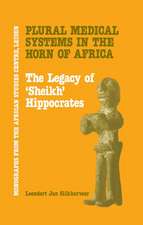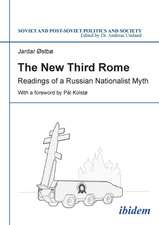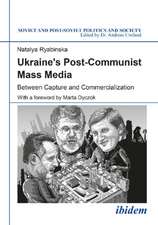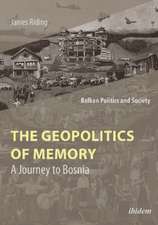Towards a New Russian Work Culture: Can Western Companies & Expatriates Change Russian Society?: Soviet and Post-Soviet Politics and Society
Autor Vladimir Karacharovskiy, Ovsey Shkaratan Dr. Andreas Umland Autor Gordey Yastreboven Limba Engleză Paperback – oct 2016
Din seria Soviet and Post-Soviet Politics and Society
-
 Preț: 280.65 lei
Preț: 280.65 lei - 14%
 Preț: 179.17 lei
Preț: 179.17 lei - 7%
 Preț: 121.80 lei
Preț: 121.80 lei - 8%
 Preț: 130.80 lei
Preț: 130.80 lei - 14%
 Preț: 196.43 lei
Preț: 196.43 lei - 13%
 Preț: 244.87 lei
Preț: 244.87 lei - 12%
 Preț: 267.50 lei
Preț: 267.50 lei - 14%
 Preț: 180.05 lei
Preț: 180.05 lei - 8%
 Preț: 150.51 lei
Preț: 150.51 lei - 13%
 Preț: 232.31 lei
Preț: 232.31 lei - 11%
 Preț: 203.31 lei
Preț: 203.31 lei - 13%
 Preț: 230.98 lei
Preț: 230.98 lei - 11%
 Preț: 212.38 lei
Preț: 212.38 lei - 14%
 Preț: 185.64 lei
Preț: 185.64 lei - 8%
 Preț: 320.60 lei
Preț: 320.60 lei - 13%
 Preț: 174.13 lei
Preț: 174.13 lei - 8%
 Preț: 322.49 lei
Preț: 322.49 lei - 13%
 Preț: 233.22 lei
Preț: 233.22 lei - 8%
 Preț: 322.97 lei
Preț: 322.97 lei - 11%
 Preț: 205.59 lei
Preț: 205.59 lei - 30%
 Preț: 195.87 lei
Preț: 195.87 lei - 13%
 Preț: 251.75 lei
Preț: 251.75 lei - 8%
 Preț: 147.37 lei
Preț: 147.37 lei - 14%
 Preț: 165.45 lei
Preț: 165.45 lei - 12%
 Preț: 235.99 lei
Preț: 235.99 lei - 8%
 Preț: 145.49 lei
Preț: 145.49 lei - 14%
 Preț: 165.39 lei
Preț: 165.39 lei - 11%
 Preț: 205.22 lei
Preț: 205.22 lei - 8%
 Preț: 151.69 lei
Preț: 151.69 lei - 9%
 Preț: 317.76 lei
Preț: 317.76 lei - 14%
 Preț: 193.13 lei
Preț: 193.13 lei - 11%
 Preț: 211.00 lei
Preț: 211.00 lei - 8%
 Preț: 153.44 lei
Preț: 153.44 lei - 8%
 Preț: 322.02 lei
Preț: 322.02 lei - 8%
 Preț: 152.74 lei
Preț: 152.74 lei - 12%
 Preț: 235.27 lei
Preț: 235.27 lei - 13%
 Preț: 167.15 lei
Preț: 167.15 lei - 8%
 Preț: 320.13 lei
Preț: 320.13 lei - 11%
 Preț: 205.76 lei
Preț: 205.76 lei - 9%
 Preț: 144.09 lei
Preț: 144.09 lei - 13%
 Preț: 245.30 lei
Preț: 245.30 lei - 8%
 Preț: 145.10 lei
Preț: 145.10 lei - 8%
 Preț: 151.00 lei
Preț: 151.00 lei - 8%
 Preț: 146.34 lei
Preț: 146.34 lei - 8%
 Preț: 322.60 lei
Preț: 322.60 lei - 8%
 Preț: 153.78 lei
Preț: 153.78 lei - 8%
 Preț: 151.92 lei
Preț: 151.92 lei - 11%
 Preț: 204.60 lei
Preț: 204.60 lei
Preț: 147.06 lei
Preț vechi: 159.40 lei
-8% Nou
Puncte Express: 221
Preț estimativ în valută:
28.14€ • 29.27$ • 23.23£
28.14€ • 29.27$ • 23.23£
Carte disponibilă
Livrare economică 25 martie-08 aprilie
Preluare comenzi: 021 569.72.76
Specificații
ISBN-13: 9783838209029
ISBN-10: 3838209028
Pagini: 256
Dimensiuni: 150 x 210 x 17 mm
Greutate: 0.35 kg
Ediția:Nouă
Editura: Ibidem Press/Ibidem-Verlag
Colecția Ibidem Press/Ibidem-Verlag
Seria Soviet and Post-Soviet Politics and Society
ISBN-10: 3838209028
Pagini: 256
Dimensiuni: 150 x 210 x 17 mm
Greutate: 0.35 kg
Ediția:Nouă
Editura: Ibidem Press/Ibidem-Verlag
Colecția Ibidem Press/Ibidem-Verlag
Seria Soviet and Post-Soviet Politics and Society
Recenzii
This volume is by no means just an exposition of yet another point of view on the phenomenon of Russian work culture and its role in Russias modernization breakthroughs. It presents an unexpected and original approach, an absolutely new perspective of this seemingly old topic. On the one hand, the authors consider Russias national work culture in the context of foreign influence and test it for resistance to external pressures. On the other hand, they reveal the foreign trace in its fabric ― the features that were introduced and internalized in the course of direct and indirect contacts with foreign cultures. For the authors, Russian national work culture is not a finished, static entity, but a dynamic system that is in permanent interaction with (predominantly) Western culture and has largely developed in direct competition with it. It is this approach that makes this book exceptionally appealing. -- Vladimir N. Leksin, Institute of System Analysis of the Russian Academy of Sciences
